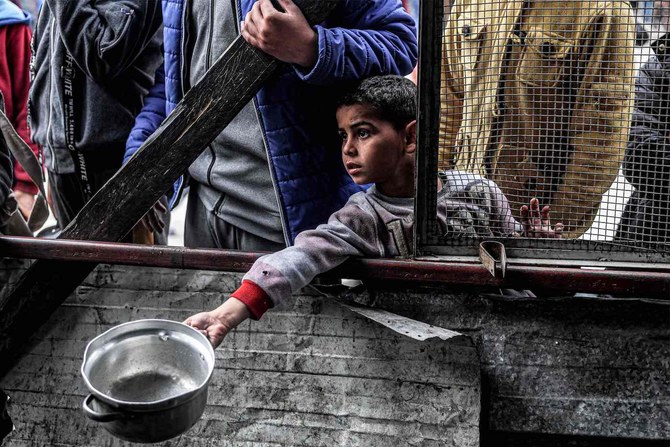NEW YORK CITY: Famine is imminent in northern Gaza, where 70 percent of the remaining population is experiencing catastrophic hunger, and it could happen any time between now and May, the UN’s food agency said on Monday.
The report by the World Food Program warned that a very small window of opportunity remains to avert this disastrous outcome, and cautioned that any further escalation of the conflict between Israel and Hamas could result in the starvation of half of the people in the territory.
Alarming data from the WFP report on the Integrated Food Security Phase Classification, a tool that measures the scale of hunger crises, revealed that everyone in Gaza is struggling to find enough to eat, and about a third of the 2.3 million population is experiencing the highest level of catastrophic hunger.
Northern parts of the Strip, including Gaza city, which has suffered a devastating level of destruction as a result of Israeli military operations, is bearing the brunt of the humanitarian catastrophe. Thousands of residents there are forced to eat animal feed to survive, and more than 25 people people have already died of dehydration and starvation, including at least 20 children.
The report was based on data collected by 18 agencies, both within the UN and external. It said the entire population of Gaza continues to be under siege amid intense and widespread ground assaults and air strikes that have killed more than 31,000 people and injured more than 73,000.
About 1.9 million people have been displaced, and more than half of all buildings in Gaza have been damaged or destroyed, as has much of the infrastructure vital to the survival of the civilian population, including food, water and healthcare systems.
The report highlights as a key driver of the famine threat the “constraints on humanitarian action throughout the Gaza Strip, (which) include direct strikes with explosive weapons on humanitarian convoys, detention of humanitarian staff, road closures, checkpoints, and related blockages or delays on main transportation corridors.”
It continues: “Physical access constraints further limit the movement of humanitarian and commercial traffic, including road damage from bombardment and traffic of heavy military vehicles, as well as the accumulation of an estimated 12,000 metric tonnes of debris that may take up to four years to fully clear.”
Pressure from allies continues to mount on Israeli authorities to allow much greater amounts of aid to freely flow into Gaza, and open more border crossings to facilitate this.
Ahead of the release of the WFP report, the EU’s high representative for foreign affairs and security policy, Josep Borrell, again accused Israel of using starvation as a weapon of war.
“Hundreds of trucks are waiting to enter (Gaza) and it is absolutely imperative to make crossing points work effectively and open additional crossing points,” he said.
“It is just a matter of political will — Israel has to do it. It is not a question of logistics. It is not because the UN has not provided enough support. The support is there, waiting. Trucks are stopped, people are dying while the land crossings are artificially closed.
“And yes, it is good to look at support by sea or by air, but we have to remind (ourselves) that we have to do it because the natural way of providing support is being closed. Artificially closed.
“We send parachutes to a place that is one hour by car from the airport. Why do not we not send it to the airport? Because they do not let it, and this is unacceptable. Starvation is used as a weapon of war.”
Israeli authorities continue to deny that they are imposing any restrictions on aid entering Gaza, instead blaming the UN and its Relief and Works Agency for Palestine Refugees for failing to distribute the aid.
UN Secretary-General Antonio Guterres described the report on food insecurity in Gaza as “an appalling indictment of conditions on the ground for civilians.”
He added: “This is the highest number of people facing catastrophic hunger ever recorded by the Integrated Food Security Phase Classification system, anywhere, anytime,” but it is “an entirely man-made disaster” that can still be halted.
“Today’s report is exhibit A for the need for an immediate humanitarian ceasefire,” said Guterres as he once again called on Israel to provide “complete and unfettered access for humanitarian goods throughout Gaza, and for the international community to fully support our humanitarian efforts.”
He added: “We must act now to prevent the unthinkable, the unacceptable and the unjustifiable.”
Arif Hussein, the WFP’s chief economist told Arab News the main takeaway from the report should be that “we as humanity, as a world, come together to make sure that innocent children, women and men don’t die because of something which is avoidable.
“We need to have serious work. You need to be able to get to these people and we need to provide them with the right assistance.”
















